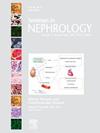Group Medical Care Models Transforming Access to Kidney Disease Treatment: An Argentine Experience
IF 3.5
3区 医学
Q2 UROLOGY & NEPHROLOGY
引用次数: 0
Abstract
As the prevalence of kidney disease rises in Latin America, there is increasing awareness of the importance of early detection and prevention. However, in a region characterized by socioeconomic inequality, variable access to care, and an overwhelmed primary health system, health professionals must find new and innovative ways of delivering care that is cost effective and mindful of patients’ needs and social determinants of health. Group medical care (GMC), a model combining group visits and peer support with personalized care, has emerged as an intervention with proven benefits in clinical outcomes, patient satisfaction, and cost effectiveness in the management of chronic illnesses. In this article we present the case of Renalida, a kidney clinic in Argentina that has adopted GMC to improve access, engagement, and standards of care for older patients with chronic kidney disease (CKD). Beyond it being the first documented case of GMC for CKD in Latin America, Renalida brings to light many of the common barriers to effective early CKD care throughout the region and proposes a viable and holistic solution. In addition, we explore future directions, including the application of implementation science to leverage strategies such as GMC to improve both access to and quality of CKD care.
团体医疗模式改变了肾病治疗:阿根廷的经验。
随着拉丁美洲肾脏疾病患病率的上升,人们越来越意识到早期发现和预防的重要性。然而,在一个以社会经济不平等、获得医疗服务的机会不同和初级卫生系统不堪重负为特征的地区,卫生专业人员必须找到新的和创新的方式来提供具有成本效益的医疗服务,并考虑到患者的需求和健康的社会决定因素。团体医疗(GMC)是一种将团体就诊和同伴支持与个性化护理相结合的模式,已被证明在慢性疾病管理的临床结果、患者满意度和成本效益方面具有益处。在这篇文章中,我们介绍了阿根廷肾诊所Renalida的案例,该诊所采用GMC来改善老年慢性肾病(CKD)患者的可及性、参与度和护理标准。Renalida是拉丁美洲第一个记录在案的慢性肾病GMC病例,它揭示了整个地区有效的早期慢性肾病治疗的许多常见障碍,并提出了一个可行的整体解决方案。此外,我们还探讨了未来的发展方向,包括应用实施科学来利用GMC等策略来改善CKD护理的可及性和质量。
本文章由计算机程序翻译,如有差异,请以英文原文为准。
求助全文
约1分钟内获得全文
求助全文
来源期刊

Seminars in nephrology
医学-泌尿学与肾脏学
CiteScore
5.60
自引率
0.00%
发文量
27
审稿时长
6-12 weeks
期刊介绍:
Seminars in Nephrology is a timely source for the publication of new concepts and research findings relevant to the clinical practice of nephrology. Each issue is an organized compendium of practical information that serves as a lasting reference for nephrologists, internists and physicians in training.
 求助内容:
求助内容: 应助结果提醒方式:
应助结果提醒方式:


